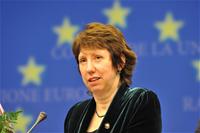What changes does the Lisbon Treaty introduce?
Adelina Marini, December 1, 2009
 As of today, after a long interinstitutional wandering and disputes, the Lisbon Treaty is coming into force, signed in 2007 and now ratified by all member states. Right after its entering into force, the new president of the Union assumes his job, according to the decision of the European Council from the 19th of November. This is the Belgian Herman van Rompuy. His post replaces the existing rotation presidency of member states which rotated every 6 months. It is hoped now that the Lisbon Treaty will help avoid the setting of priorities for the Eu on the basis of the national interests of separate member states.
As of today, after a long interinstitutional wandering and disputes, the Lisbon Treaty is coming into force, signed in 2007 and now ratified by all member states. Right after its entering into force, the new president of the Union assumes his job, according to the decision of the European Council from the 19th of November. This is the Belgian Herman van Rompuy. His post replaces the existing rotation presidency of member states which rotated every 6 months. It is hoped now that the Lisbon Treaty will help avoid the setting of priorities for the Eu on the basis of the national interests of separate member states.
The second very important post, established with the Lisbon Treaty, is the Higher representative for Foreign Affairs and Security, for which the British baroness Catherin Ashton has been elected. Before assuming her duties thought, she will have to secure approval by the European Parliament which is expected to happen tomorrow. The job of Lady Ashton unites in 1 the existing post of High Representative for Common Foreign and Security Policy of Javier Solana and the European Commissioner for foreign relations and neighbourhood policy, held by the Austrian Benita Ferrero-Waldner. Lady Ashton will also be a vice president of the European Commission with a mandate of 5 years, as the Commission, unlike president Van Rompuy who has been elected for 2 years and a half.
for Foreign Affairs and Security, for which the British baroness Catherin Ashton has been elected. Before assuming her duties thought, she will have to secure approval by the European Parliament which is expected to happen tomorrow. The job of Lady Ashton unites in 1 the existing post of High Representative for Common Foreign and Security Policy of Javier Solana and the European Commissioner for foreign relations and neighbourhood policy, held by the Austrian Benita Ferrero-Waldner. Lady Ashton will also be a vice president of the European Commission with a mandate of 5 years, as the Commission, unlike president Van Rompuy who has been elected for 2 years and a half.
The Lisbon Treaty also introduces a change in the way the European Council will vote. The Qualified Majority mechanism is introduced which represents 2/3 of member states + 2/3 of the population of the Union. However this principle will not apply for all issues.
Significant changes are introduced in the field of justice and home affairs. Many issues in this field will move from the consultation procedure with unanimity in the Council and only consultation of the European Parliament (EP) to the ordinary legislative procedure with qualified majority voting (QMV) in the Council and full co-legislative powers of the EP.
The main areas which move from unanimity to QMV in the Council and the ordinary legislative
procedure are: part of the rules on short-stay visas and residence permits (it applies for citizens from third countries); legal immigration; judicial cooperation in criminal matters; non-operational police cooperation; Europol. Subject to QMV will be asylum policy and illegal immigration.
With unanimity will be taken decisions related to passports and identity cards, family law, as well as the issues related to the new European Public Prosecutor's Office. The setting-up of a European Public Prosecutor's Office is not an obligation, but a possibility with the main goal to combat crimes affecting the financial interests of the EU. The new Office will also investigate crimes of the competences of Europol. The European Council can extend the office's powers to also cover serious crime having a cross-border dimension.
The Treaty foresees the establishment of another service - the new standing committee on internal security which will work within the Justice and Home Affairs Council. The main objective of the committee is to facilitate, promote and strengthen coordination of operational actions
between EU member states in the field of internal security. This includes police and customs cooperation, external border protection and judicial cooperation in criminal matters relevant to operational cooperation in the field of internal security. When established, the committee shall regularly report on its activities to the Council which, in return, shall keep the EP and national parliaments informed.
The committee will consist of representatives from the national ministries of justice and home affairs but their number will be limited to ensure the efficiency of the committee's work.
To mark the entering into force of the Lisbon Treaty, the Justice and Home Affairs Council has decided to make its session today public which can be followed here.
Beside the Justice and Home Affairs Council, we can also follow online the session of the Employment, Social policy, Health and Consumer Affairs Councils.
 The presidency of the separate council, like for example the meetings of the ministers of agriculture, justice, employment, education etc., will be kept as it is now - by member states. An exception is the General Affairs and External Relations Council (GAERC) which will now be presided by Lady Ashton. Thus, the president of today's Justice and Home Affairs Council was presided by the Swedish minister of justice whose country now presides the European Council. As of 1st of January Spain will assume presidency and Bulgaria's turn will be in the second half of 2018. This order will be kept until 2020 and in 2017 the European Council will have to decide how to transform the presidency of the separate Councils into permanent instead of rotational.
The presidency of the separate council, like for example the meetings of the ministers of agriculture, justice, employment, education etc., will be kept as it is now - by member states. An exception is the General Affairs and External Relations Council (GAERC) which will now be presided by Lady Ashton. Thus, the president of today's Justice and Home Affairs Council was presided by the Swedish minister of justice whose country now presides the European Council. As of 1st of January Spain will assume presidency and Bulgaria's turn will be in the second half of 2018. This order will be kept until 2020 and in 2017 the European Council will have to decide how to transform the presidency of the separate Councils into permanent instead of rotational.